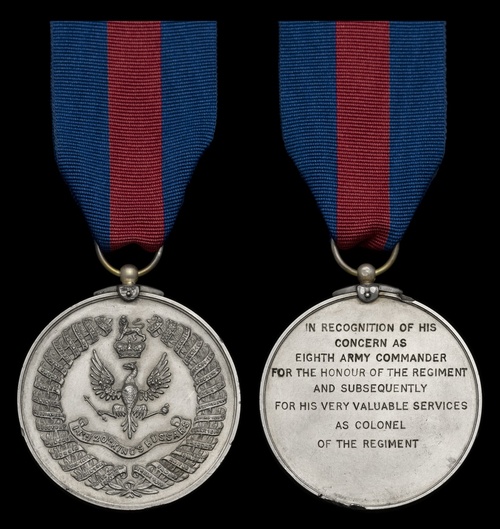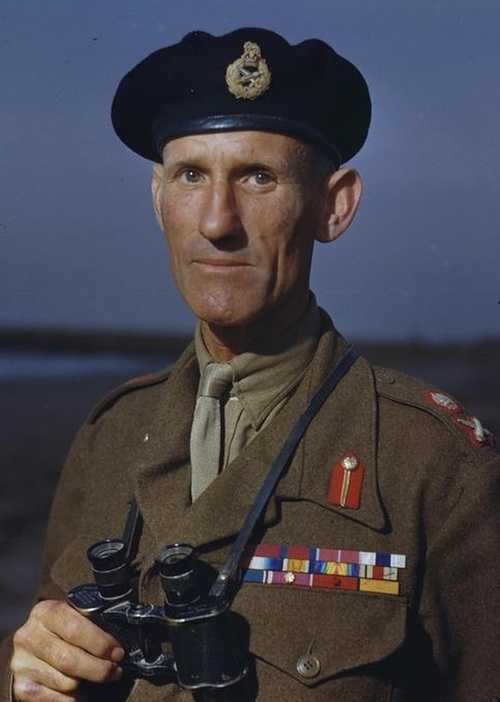Auction: 24003 - Orders, Decorations and Medals
Lot: 284
The fascinating 14th/20th King's Hussars Regimental Medal awarded to General Sir R. L. McCreery G.C.B., K.B.E., D.S.O., M.C., a career soldier and cavalryman who commanded the famous Eighth Army in the latter stages of the Second World War
14th/20th King's Hussars Regimental Medal, by Phillips of Aldershot, silver, 68mm including ring suspension, the reverse engraved 'In Recognition Of His Concern As Eighth Army Commander For the Honour Of The Regiment And Subsequently For His Very Valuable Services As Colonel Of The Regiment', the edge engraved 'General Sir Richard L. McCreery G.C.B. K.B.E. D.S.O. M.C. 1952', several minor edge knocks, about very fine
Since its inception, the Regimental Medal has been awarded 257 times, with 21 Bars donating a Second Award. General Sir Richard McCreery's Medal is 70th on the list of recipients to-date. The website of the King's Royal Hussars elaborates further, stating that: 'The medal is awarded to any officer, warrant officer, non-commissioned officer or soldier in the Regiment who has contributed to the military efficiency or military honour of the Regiment. It is laid down that length of service or attainment of a certain rank not, in itself, be counted as a sufficient qualification. A bar to the medal is awarded to those who would again have earned a medal in a different sphere of Regimental life. Since 1960, attached personnel have also been eligible for the award. A committee consisting of the Commanding Officer, the Second-in-Command, the Squadron Leaders and the Adjutant decide upon the award of the Medal.
The 14th/20th King’s Hussars Regimental Medal has been carried forward unchanged to The King’s Royal Hussars, who remain one of only two regiments in the British Army to award a Regimental Medal.
Richard Loudon McCreery was born in February 1898 and, after an Eton education, finished 12th out of 212 entrants to the Royal Military College Sandhurst at the age of only 17. Commissioned into the 12th (The Prince of Wales's Royal) Lancers as Second Lieutenant on 11 August 1915, McCreery was sent to France in January 1916. On 11 April 1917 (as part of the Battle of Arras), he was dangerously wounded by machine-gun fire and, refusing to have his right leg amputated, was lucky to only lose several toes - however, this caused him to walk with a pronounced limp for the rest of his life. He returned to duty with the 12th Lancers during the Hundred Days Offensive, in a traditional - and rare - Cavalry role. McCreery was awarded the Military Cross for his actions on 9 November 1918 when his patrol attacked a German machine-gun post, successfully capturing it along with ten prisoners.
Remaining in the post-war Army, McCreery was appointed Adjutant of his regiment in 1921 and attended Staff College from 1928-29. Brigade Major of the 2nd Cavalry Brigade in 1930, he was finally promoted to command his regiment in 1935. During these inter-war years he also found time to indulge in his great passion for horsemanship, winning the Grand Military Gold Cup (at Sandown Park Racecourse) in both 1923 and 1928; in 1924 he and his younger brother Captain Selby McCreery made up half the Army polo team that played against the United States team. He was also an accomplished huntsman, becoming joint Master of Foxhounds with the Blackmore Vale Hunt.
Upon the outbreak of the Second World War, McCreery was in France as commander of the 2nd Armoured Brigade and upon evacuation to the United Kingdom was promoted acting Major-General: an impressive feat considering he was still only forty-two years old. A significant exponent of tank warfare, Major-General McCreery gained recognition and plaudits at the highest levels for his skill and technical ability - his next posting overseas saw him appointed Adviser, Armoured Fighting Vehicles, Middle East and was variously chief adviser to General Auchinleck, Chief of General Staff to General Sir Harold Alexander, and Chief of General Staff, Middle East Command. His advice and expertise in armoured warfare made a significant contribution to victory at the Second Battle of El Alamein and the eventual deafeat of all Axis troops in North Africa.
After temporary command of VIII Corps back in the U.K., in August 1943 McCreery was selected to command X Corps for the Italian Campaign. This formation was heavily involved in the Salerno Landings, the first battle of Monte Cassino, and the capture of Rome. In July 1944 he had the particular distinction of being knighted in the field by H.M. King George VI whilst on an official tour of Italy. Next assuming command of the famous Eighth Army on 1 October 1944, McCreery ably commanded it during 'Operation Grapeshot' (the 1945 spring offensive), the end result of which was the surrender of nearly one million German soldiers. Consequently he was the last commander of that formation before it was disbanded and re-constituted as 'British Troops Austria', and also the only cavalryman to command it.
Post-war, McCreery was immediately appointed General Officer Commanding-in-Chief, British Forces of Occupation in Austria. From 1946-48 he held the same position for the British Army of the Rhine, and from 1948-49 was the British Army Representative on the Military Staff Committee at the United Nations in New York City. Taking a very well-deserved retirement from the Army on 9 December 1949, two years previously McCreery had been appointed Regimental Colonel of the 14th/20th King's Hussars, a post which he fulfilled for 10 years until 1957. He was also Regimental Colonel of the 12th Royal Lancers (his old Regiment) from 1951-1961, and lived in Somerset until his death on 18 October 1967.
Subject to 20% VAT on Buyer’s Premium. For more information please view Terms and Conditions for Buyers.
Sold for
£500
Starting price
£400







